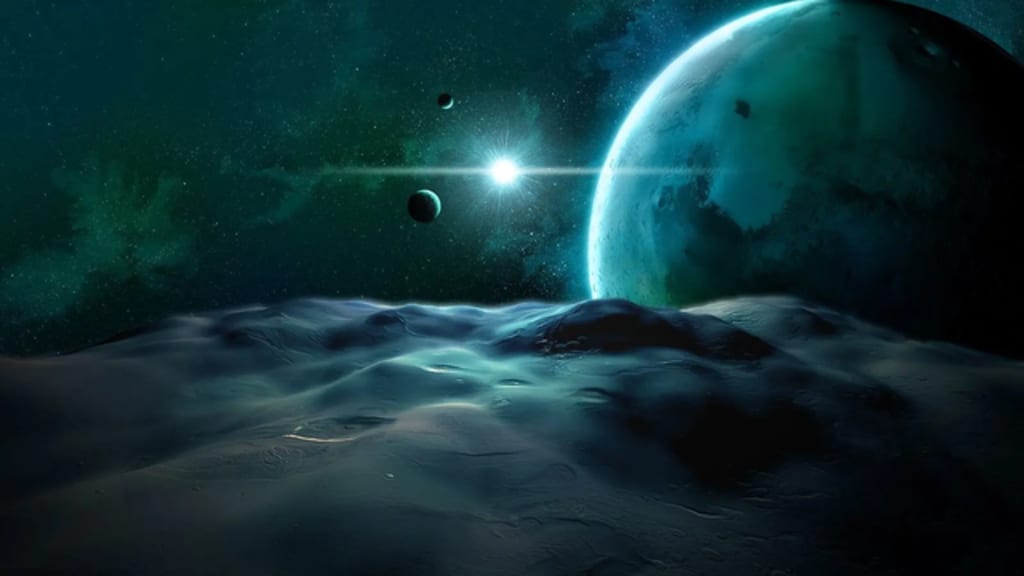DNA found in meteorites
Is it true that life on Earth came from outer space?

For humans, outer space has always had a strong attraction, and scientists, who are passionate about it, have been tirelessly searching for answers to those mysteries, but most are convinced that the Earth is the only planet in the universe that can support human life.
But a report on February 27, 2022, breaks this inherent knowledge and suggests that life on Earth may have originated in outer space.
The formation process of life
Three billion years ago, the Earth, which experienced the initial stage of formation, gradually transitioned to a new stage of development. At this time, the atmosphere had given birth to a variety of gases, such as nitrogen, carbon dioxide, and methane, but no oxygen.
When the gases combined with substances in the earth's crust and dissolved in water, under the action of cosmic rays and high temperatures, organic compounds were gradually formed, such as nucleotides and monosaccharides, which were mainly concentrated in the oceans to survive and develop, providing the basic conditions for the emergence of subsequent life.
The tetravalent carbon bond in organic compounds reacts easily with other elements, and thousands of organic compounds have more or less carbon in them.
In addition to carbon, proteins and nucleic acids are also important components of life, but different scientists have different views on this, some scientists believe that biological macromolecules after the rain, will be gathered in the ocean, and then form other organic matter.
Some scientists believe that the various amino acids and nucleotides living in the oceans are adsorbed onto the surface of the material before polymerization can take place.
After the polymerization reaction occurs, only then can form the protein and nucleic acid and other substances, and then in a certain order of arrangement develop the function, and constantly perfect, after a long time to give birth to the original life, but this process may also not happen in the Earth, because the scientists' discovery or will overturn the perception.
Discoveries in space meteorites
The reason why it is possible to break the inherent perceptions and publish such new ideas is mainly based on the overly amazing composition of the meteorite. It is known that this meteorite from space carries both pyrimidines and purines, which are both important components of DNA.
Pyrimidines belong to heterocyclic compounds, which are common in DNA and RNA, and are one of the important components without which it is difficult to form matter and life; purines belong to cyclic aromatic organic compounds, which are mainly formed during biological metabolism, so the discovery of pyrimidines and purines can largely prove that life may exist in outer space.
And experts from the University of Jena, Germany, have personally simulated the space environment, trying to synthesize peptide chains under such conditions, peptide chains belong to the substances that exist between amino acids and proteins, which is one of the basic elements that constitute life, and the final experimental results show that the space environment can synthesize peptide chains.
Some researchers believe that there may be more than one kind of living material in space, and even distribute various nucleic acids and bases.
To further confirm the speculation, the meteorite was further examined by scientists using modern inspection techniques, and it was subsequently found to have fallen into Australia as early as 1969, and even more surprisingly, according to the identification of the silicon carbide particles, the meteorite was born 7 billion years ago, even before the appearance of the Earth.
Although the public perception is that all life on Earth originated on Earth, this view cannot explain the ancient meteorites that carry the genes of life, so some scientists believe that perhaps the origin of life began in outer space, perhaps even earlier than the formation of the solar system.
The reason why it has never been discovered is due to natural disasters, which led to the fact that life in space had nowhere to rest and could only be perceived after it fell to Earth with the meteorites.
Bold speculation
Once the report on the discovery of space meteorites was published, it caused a wide debate in the scientific community, with scientists from different research perspectives each stating their views and each being able to provide evidence to support their opinions.
Scientists who believe that life first originated in outer space have not only produced evidence of the special components carried in the meteorite but have also put forward an even more unbelievable idea, stating that the first life may have entered Earth on a spaceship and settled here.
Some even speculate that such meteorites with traces of life might have been flown from Mars, which after all was also very habitable and had the opportunity to give birth to live 7 billion years ago.
But because of the boldness of such a conjecture, many scientists say that it is difficult to accept, but also supported by some scientists, because according to the "origin theory", the new coronavirus sweeping the world may also come from outer space, after all, according to the theory, life on Earth is closely related to the universe, and many of the basic materials to survive are from and Outer space.
Water, for example, is undeniably important to live, and most scientists would like to believe that it was some of the stars with water that collided with the Earth that gave rise to the water resources on Earth.
In addition, scientists have also found many organic substances in space, including methane, amino acids, etc., which are the basic building blocks of life, without which it would be impossible to synthesize those complex organic substances.
So it can also be boldly speculated that other kinds of substances that feed life came to Earth from outer space in various ways.
The discovery of DNA nucleobases in space meteorites is really surprising, and the age of such life-forming materials, together with the age of the meteorites, can indeed prove to some extent that life on Earth may have originated in space, and that some celestial bodies could nurture life before the Earth.
However, the original scientific conclusions can not be completely denied, the idea that life originated in space, has not yet come up with clear evidence, scientists are still in the research stage, no consensus, so it is still just a guess.
About the Creator
Karen Gillanah
The aggravation that can be told is not aggravation; the lover that can be snatched away is not a lover.






Comments
There are no comments for this story
Be the first to respond and start the conversation.